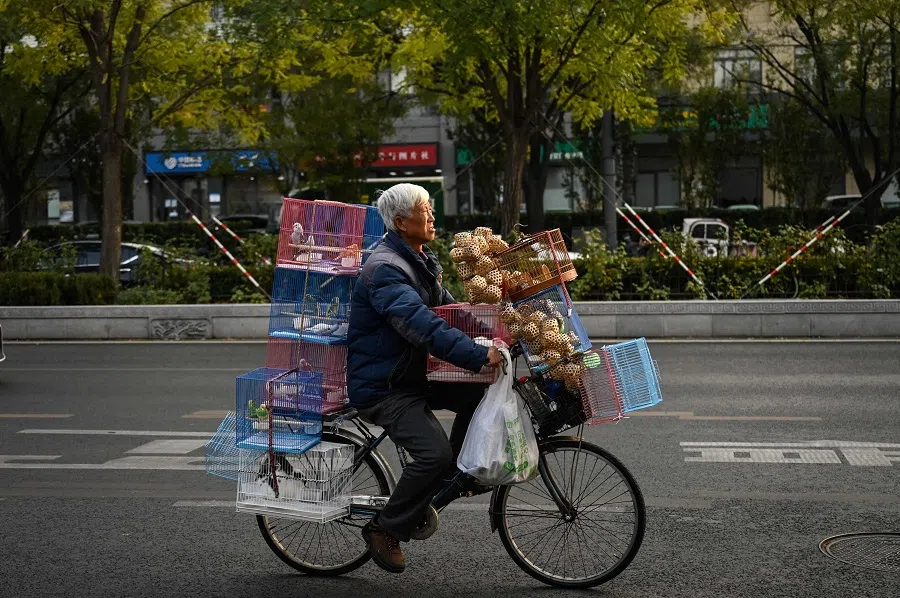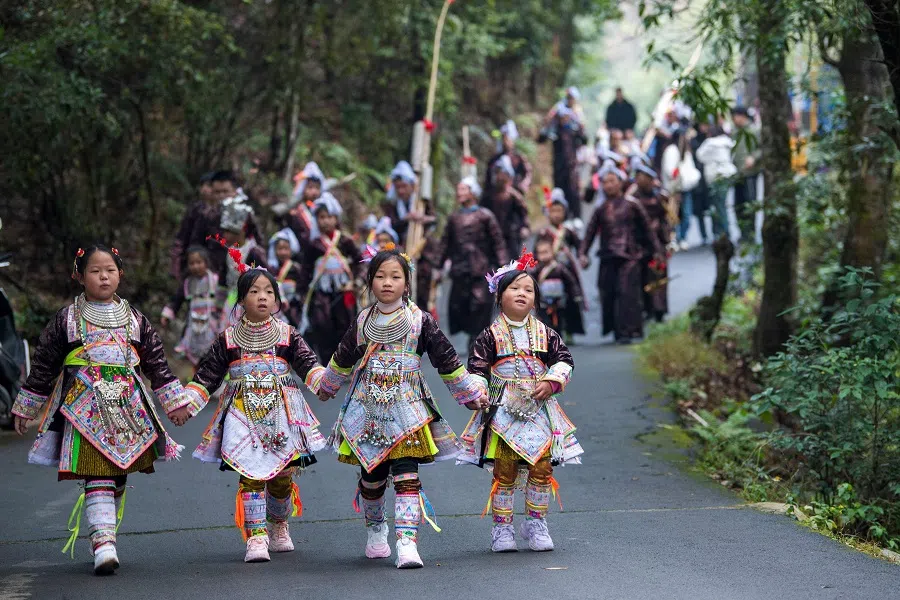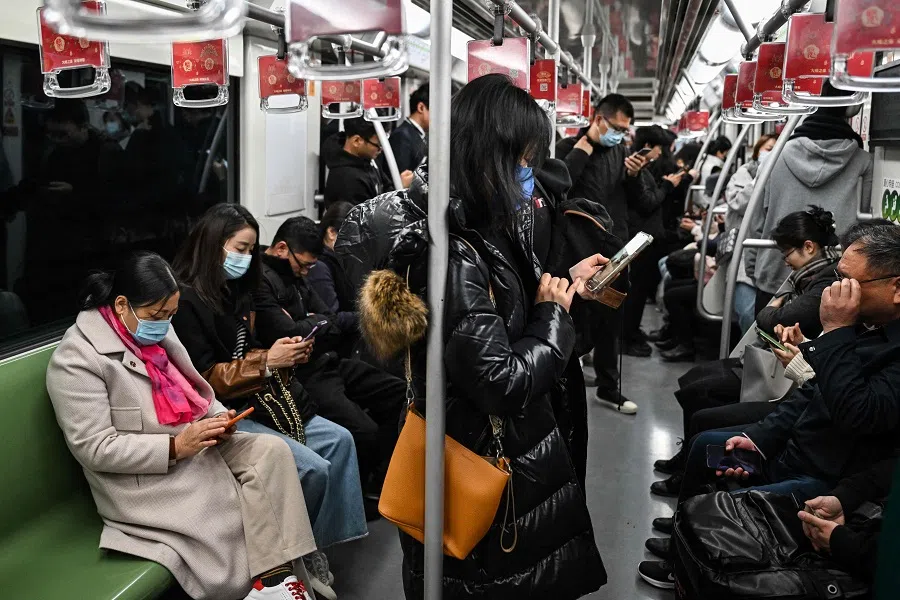Passing of Kathy Chow puts focus on the rise of people living alone in China
Several media reports of Hong Kong star Kathy Chow's passing seemed to have highlighted the fact that she was living alone. Advertently, her death has sparked off discussions about the rise of Chinese living alone and the stigma and policy challenges behind the trend. Lianhe Zaobao's China Desk examines the issue.

Hong Kong star Kathy Chow passed away on 11 December. A day after news broke of her death, her studio confirmed on 12 December that the actress had died "due to illness".
The passing of the 57-year-old, who is remembered for her portrayal as the "most gorgeous" Zhou Zhiruo from Jin Yong's wuxia novel, saddened many netizens. Amid the outpouring of grief, images and videos of the late star have been circulated on various social media platforms.
... media reports linked Chow's passing to her solitary lifestyle and even hinted that her sudden demise could have been avoided if she had children and did not live alone.
After featuring her showbiz career that spanned more than three decades, media outlets started focusing on the cause of her death, with medical terms such as "thrombocytopenia" and "lupus erythematosus" becoming top online searches. Thereafter, the public also became interested in Chow's singlehood, and "The trouble with Kathy Chow's solitude" became a hot topic.
Living and dying alone
While expressing their condolences at her passing, media outlets highlighted that she "was unmarried and did not have children". Their coverage also included previous interview clips with Chow in which the latter spoke about living alone quite positively. She said that she was living the life she wanted and she was not afraid to say that "one can lead a very happy life even without getting married".
On many occasions, Chow made comments such as "Having a man by my side is not a necessity, it can be a hindrance" and "I don't feel that marriage is wonderful...I don't enjoy being controlled". Nevertheless, media reports linked Chow's passing to her solitary lifestyle and even hinted that her sudden demise could have been avoided if she had children and did not live alone.
"The trouble with Kathy Chow's solitude" was among the top Weibo topics on 14 December and netizens were unequivocal in their condemnation and criticism of the media portrayals. Some netizens felt that "focusing on the downsides of living alone to pressure singles into getting married" was "taking advantage of Chow's demise", "reaping benefits from her plight", and "using her death to force singles into marriage".

A netizen had the following rebuttal: "Marriage can also be deadly. Have you not heard of spousal abuse, husbands who infect their wives with venereal diseases, or the woman who was pushed off a cliff by her husband?"
Another netizen urged the media not to link everything to living alone because death comes to everyone. The netizen shared, "I have a relative with four children but she passed away alone in an old folks' home and no one noticed that she had stopped breathing."
... more than 30% of households in 2030 could be single-person households.
The state of living alone in China
The backlash by Chinese netizens highlights the rise of living alone in China over the last two years.
When the results of China's seventh population census were released in 2021, there were 125 million single-person households in the country, or 25.40% of the total. Such households only made up 8.30% and 13.98% of total households respectively in the fifth and sixth censuses (conducted in 2000 and 2010), indicating an obvious uptrend.
In 2021, Beike Research Institute, a Chinese real estate research agency, published a report entitled "The New Era of Living Alone" (《新独居时代报告》). Accoding to the report's preliminary estimates, 150 to 200 million Chinese would be living alone by 2030. In other words, more than 30% of households in 2030 could be single-person households.
Government surveys also found that not only did a greater proportion of seniors live alone, but a significant percentage of urban dwellers between the ages of 20 and 49 years old were doing so too. The surveys said that such youths who lived in first-tier or priority second-tier cities were ushering in a "new era of living alone".

On social media platforms, discussions and videos on "Youths who live alone" generate plenty of interest. In 2021, "Living alone diary" (独居日记) and "Adventures of eating alone" (一人食记) generated 5.2 billion and 4.2 billion views on Douyin respectively.
However, public opinion in China tends to paint a negative picture of youths who live alone, often giving them negative labels such as "isolated", "contradictory", and "mental problems". For example, the following online refrain is often used to depict the life of a lone dweller - One lone dweller, two sleepy eyes, three take-out meals, four Taobao seasons (一人独居,两眼惺忪,三餐外卖,四季淘宝).
In 2021, the magazine China Comment, published by Xinhua News Agency, ran a feature on the problems faced by youths living alone. According to the article, due to weak social connections and taxing work, youths who live alone and often in the big cities, end up by choice or otherwise without a social circle, have no sense of belonging, have no interest in socialising, and lack long-term plans. Often, they face the mental conundrum of enjoying solitude while craving companionship.
However, in the Douban interest group, "A guide to solitary living" (独居生活指南), many youths share their experiences of living alone and their hobbies, including eating, working out, reading and other activities. From their words and photos, the youths seem to be promising individuals who are independent, disciplined and confident - a far cry from the ill-adjusted youths described by the media.
At the same time, these singles are building up the solo economy which is becoming increasingly significant as Chinese businesses target them for solo hotpot sets and travel packages. Additionally, more household appliances suited for smaller homes are now available in China to cater to single-person households.
However, as rightly pointed out by a netizen: linking Chow's death to living alone is both disrespectful to Chow and those who live alone.
Targeting singles to tackle the issue
In 2022, China's population contracted for the first time in 60 years and its government is worried by the declining birth rates. Over the last few years, local government officials have racked their brains thinking of measures to boost both marriage and birth rates, but to no avail.

On 11 December, YuWa Population Research, a Chinese think tank, published an article by its experts stating that children are the best investment for the Chinese economy and that "giving birth is both family and national business".
The Chinese authorities are upset with the growing number of singles who preach individualism and may have given the media leeway to take advantage of public interest in celebrity news to expound on the social issue. However, as rightly pointed out by a netizen: linking Chow's death to living alone is both disrespectful to Chow and those who live alone.
Some netizens also felt that if living alone could indeed be dangerous, one should tackle the problems of living alone, rather than paint those who live alone as the problem.
Chinese women are continuing to explore the possibilities of communal living today.
Another option?
In an interview with The Beijing News (《新京报》) in October, Du Peng, vice-president of the China Population Association and director of the Renmin University Institute of Gerontology (人民大学老年学研究所), said it was inevitable for the percentage of elderly living alone to increase. To improve the quality of living for this group, both the government and society should work together to roll out ageing-related reforms and create an elderly-friendly environment.
On 8 December, Yitiao, a Chinese new media outlet focusing on short video content, posted a viral video entitled "Female communes a century ago" (《100年前的女性共居实践》). The video featured an ancient commune of women dedicated to singlehood (自梳女)in the Guangdong region. These women pooled their resources to buy houses in the commune, and pledged to look out for each other and care for each other in old age until their deaths. A netizen remarked after viewing the video, "Thanks to the internet for letting me see such possibilities."

Chinese women are continuing to explore the possibilities of communal living today. In August this year, 47 women gathered at a mountain villa in the Dong Village of Guizhou for a month-long experiment in living together.
Chizuko Ueno is an emeritus professor at the University of Tokyo and a famous writer who has considerable influence in China. In recent years, she has been actively campaigning for mainstream acceptance of living alone among the elderly. She is also promoting "ageing in place" and the "de-familialisation of elderly care", which means policies that include extra-familial care.
Ueno observed that in super-aged Japan, prejudice towards the elderly living on their own has disappeared, and there is widespread societal acceptance that "living alone or separate from their children is better for the elderly".
From a governance perspective, the government's worries about China's birth rates are understandable. But using public opinion to vilify those who live alone or choose to remain single may not be wise or effective when dealing with China's youth. Instead, it may be worthwhile to devote more attention towards meeting the needs of an ageing society, such as how to provide healthcare assurance and hospice care, and developing the elderly care industry.
This article was first published in Lianhe Zaobao as "当"周海媚独居之困"照进现实".





